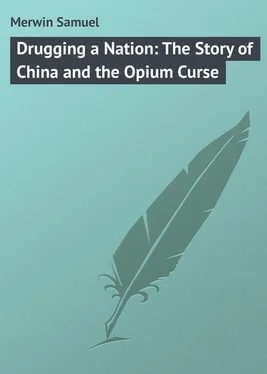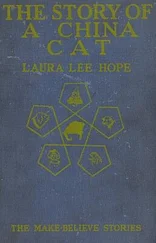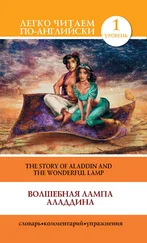Samuel Merwin - Drugging a Nation - The Story of China and the Opium Curse
Здесь есть возможность читать онлайн «Samuel Merwin - Drugging a Nation - The Story of China and the Opium Curse» — ознакомительный отрывок электронной книги совершенно бесплатно, а после прочтения отрывка купить полную версию. В некоторых случаях можно слушать аудио, скачать через торрент в формате fb2 и присутствует краткое содержание. Жанр: foreign_prose, на английском языке. Описание произведения, (предисловие) а так же отзывы посетителей доступны на портале библиотеки ЛибКат.
- Название:Drugging a Nation: The Story of China and the Opium Curse
- Автор:
- Жанр:
- Год:неизвестен
- ISBN:нет данных
- Рейтинг книги:5 / 5. Голосов: 1
-
Избранное:Добавить в избранное
- Отзывы:
-
Ваша оценка:
- 100
- 1
- 2
- 3
- 4
- 5
Drugging a Nation: The Story of China and the Opium Curse: краткое содержание, описание и аннотация
Предлагаем к чтению аннотацию, описание, краткое содержание или предисловие (зависит от того, что написал сам автор книги «Drugging a Nation: The Story of China and the Opium Curse»). Если вы не нашли необходимую информацию о книге — напишите в комментариях, мы постараемся отыскать её.
Drugging a Nation: The Story of China and the Opium Curse — читать онлайн ознакомительный отрывок
Ниже представлен текст книги, разбитый по страницам. Система сохранения места последней прочитанной страницы, позволяет с удобством читать онлайн бесплатно книгу «Drugging a Nation: The Story of China and the Opium Curse», без необходимости каждый раз заново искать на чём Вы остановились. Поставьте закладку, и сможете в любой момент перейти на страницу, на которой закончили чтение.
Интервал:
Закладка:
But we must get on with our narrative. I will try to pass it along in the form in which it has presented itself to me. If Clean and Dirty appear in closer and more puzzling alliance than we like to see them, I cannot help that.
It was not easy getting opium, the commodity, into the currents of trade. There was an obstacle. The Chinese were not an opium-consuming race. They did not use opium, they did not want opium, they steadily resisted the inroads of opium. But the rulers of the company were far-seeing men. Tempt misery long enough and it will take to opium. Two centuries ago when small quantities of the drug were brought in from Java, the Chinese government objected. In 1729 the importation was prohibited. As late as 1765, this importation, carried on by energetic traders in spite of official resistance, had never exceeded two hundred chests a year. But with the advent of the company in 1773, the trade grew. In spite of a second Chinese prohibition in 1796, half-heartedly enforced by corrupt mandarins, the total for 1820 was 4,000 chests. The Chinese government was faced not only with the possibility of a race debauchery but also with an immediate and alarming drain of silver from the country. The balance of the trade was against them. Either as an economic or moral problem, the situation was grave.
The smoking of opium began in China and is peculiar to the Chinese. The Hindoos and Malays eat it. Complicated and wide-spread as the smoking habit is to-day, it is a modern custom as time runs in China. There seems to be little doubt in the minds of those Sinologues who have traced the opium thread back to the tangle of early missionary reports and imperial edicts, that the habit started either in Formosa or on the mainland across the Straits, where malaria is common. Opium had been used, generations before, as a remedy for malaria; and these first smokers seem to have mixed a little opium with their tobacco, which had been introduced by the Portuguese in the early seventeenth century. From this beginning, it would appear, was developed the rather elaborate outfit which the opium-smoker of to-day considers necessary to his pleasure.
Nothing but solid Anglo-Saxon persistence had enabled the company to build up the trade. Seven years after their first small adventure, or in 1780, a depot of two small receiving hulks was established in Lark’s Bay, south of Macao. A year later the company freighted a ship to Canton, but finding no demand were obliged to sell the lot of 1,600 chests at a loss to Sinqua, a Canton “Hong-merchant,” who, not being able to dispose of it to advantage, reshipped it. The price in that year was $550 (Mexican) a chest; Sinqua had paid the company only $200, but even at a bargain he found no market. Meantime, in the words of a “memorandum,” prepared by Joshua Rowntree for the debate in parliament last year, “British merchants spread the habit up and down the coast; opium store-ships armed as fortresses were moored at the mouth of the Canton River.”
In 1782, the company’s supercargoes at Canton wrote to Calcutta: “The importation of opium being strongly prohibited by the Chinese government, and a business altogether new to us, it was necessary for us to take our measures (for disposing of a cargo) with the utmost caution.”
This “business altogether new to us” was, of course, plain smuggling. From the first it had been necessary to arm the smuggling vessels; and as these grew in number the Chinese sent out an increasing number of armed revenue junks or cruisers. The traders usually found it possible to buy off the commanders of the revenue junks, but as this could not be done in every case it was inevitable that there should be encounters now and then, with occasional loss of life. These affrays soon became too frequent to be ignored.
Meantime the British government had succeeded the company in the rule of India and the control of the far Eastern trade. As this trade was from two thirds to four-fifths opium, a prohibited article, and as the whole question of trade was complicated by the fact that China was ignorant of the greatness and power of the Western nations and did not care to treat or deal with them in any event, a government trade agent had been sent out to Canton to look after British interests and in general to fill the position of a combined consul and unaccredited minister. In the late 1830’s this agent, Captain Charles Elliot (successor to Lord Napier, the first agent), found himself in the delicate position of protecting English smugglers, who were steadily drawing their country towards war because the Chinese government was making strong efforts to drive them out of business. From what Captain Elliot has left on record it is plain that he was having a bad time of it. In 1837, he wrote to Lord Palmerston of “the wide-spreading public mischief” arising from “the steady continuance of a vast, prohibited traffic in an article of vicious luxury,” and suggested that “a gradual check to our own growth and imports would be salutary.” Two years later he wrote that “the Chinese government have a just ground for harsh measures towards the lawful trade, upon the plea that there is no distinction between the right and the wrong.”
He even said: “No man entertains a deeper detestation of the disgrace and sin of this forced traffic;” and, “I see little to choose between it and piracy.” But when the war cloud broke, and responsibility for the welfare of Britain’s subjects and trade interests in China devolved upon him, he compromised. “It does not consort with my station,” he wrote, “to sanction measures of general and undistinguishing violence against His Majesty’s officers and subjects.”
It will be interesting before we consider the opium war and its immense significance in history, to glance over the attitude of the company and later of its successor, the government, towards the whole miserable business. The company’s board of directors, in 1817, had sent this dispatch from Calcutta in answer to a question, “Were it possible to prevent the using of the drug altogether, except strictly for the purpose of medicine, we would gladly do it in compassion to mankind.”
It would be pleasant to believe that the East India Company was sincere in this ineffective if well-phrased expression of “compassion.” The spectacle of a great corporation in any century giving up a lucrative traffic on merely human and moral grounds would be illuminating and uplifting. But unfortunate business corporations are, in their very nature, slaves of the balance sheet, organized representatives of the mighty laws of trade. I have already quoted enough evidence to show that the company was not only awake to the dangers of opium, but that it had deliberately and painstakingly worked up the traffic. Had there been, then, a change of heart in the directorate? I fear not. Among the East Indian correspondence of 1830, this word from the company’s governor-general came to light: “We are taking measures for extending the cultivation of the poppy, with a view to a larger increase in the supply of opium.” And in this same year, 1830, a House of Commons committee reported that “The trade, which is altogether contraband, has been largely extended of late years.”
G. H. M. Batten, a formal official of the Indian Civil Service, who contributed the chapter on opium in Sir John Strachey’s work on “India, its Administration and Progress,” has been regarded of late years as one of the ablest defenders of the whole opium policy. He believes that “The daily use of opium in moderation is not only harmless but of positive benefit, and frequently even a necessity of life.” This man, seeing little but good in opium, doubts “if it ever entered into the conception of the court of directors to suppress in the interests of morality the cultivation of the poppy.”
Читать дальшеИнтервал:
Закладка:
Похожие книги на «Drugging a Nation: The Story of China and the Opium Curse»
Представляем Вашему вниманию похожие книги на «Drugging a Nation: The Story of China and the Opium Curse» списком для выбора. Мы отобрали схожую по названию и смыслу литературу в надежде предоставить читателям больше вариантов отыскать новые, интересные, ещё непрочитанные произведения.
Обсуждение, отзывы о книге «Drugging a Nation: The Story of China and the Opium Curse» и просто собственные мнения читателей. Оставьте ваши комментарии, напишите, что Вы думаете о произведении, его смысле или главных героях. Укажите что конкретно понравилось, а что нет, и почему Вы так считаете.












